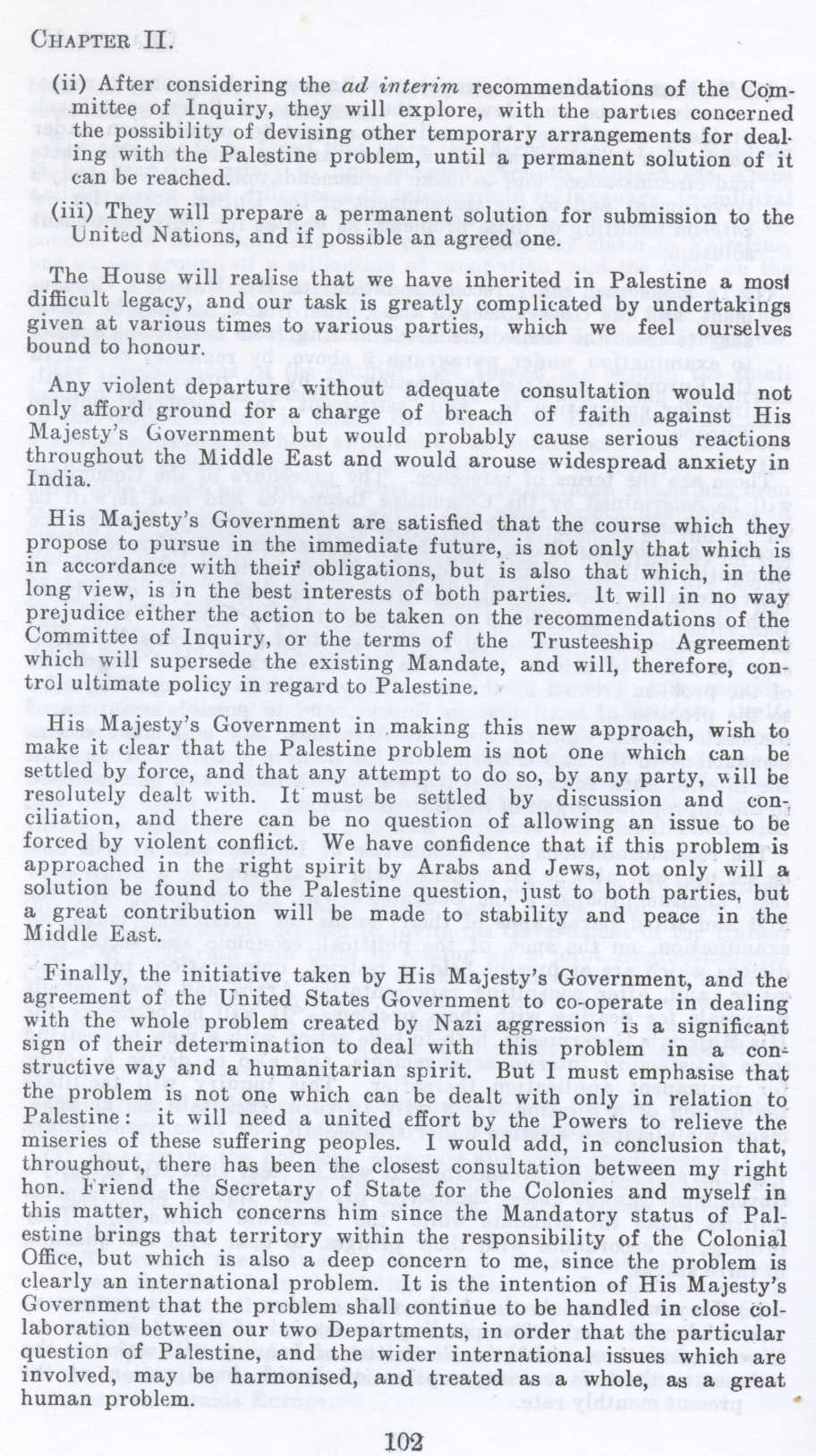| Prev | Next |  |
| Prev | Next |
| PalestineRemembered | About Us | Oral History | العربية | |
| Pictures | Zionist FAQs | Haavara | Maps | |
| Search |
| Camps |
| Districts |
| Acre |
| Baysan |
| Beersheba |
| Bethlehem |
| Gaza |
| Haifa |
| Hebron |
| Jaffa |
| Jericho |
| Jerusalem |
| Jinin |
| Nablus |
| Nazareth |
| Ramallah |
| al-Ramla |
| Safad |
| Tiberias |
| Tulkarm |
| Donate |
| Contact |
| Profile |
| Videos |
British Mandate: A Survey of Palestine: Volume I - Page 102. Annexure III: Statement made in the House of Commons on 13th November, 1945 By Mr. Ernest Bevin, Secretary of State for Foreign Affairs (Continued) |
Disclaimer
The above documents, article, interviews, movies, podcasts, or stories reflects solely the research and opinions of its authors. PalestineRemembered.com makes its best effort to validate its contents.


Post Your Comment
*It should be NOTED that your email address won't be shared, and all communications between members will be routed via the website's mail server.
(ii) After considering the ad interim recommendations of the Committee of Inquiry, they will explore, with the parties concerned the possibility of devising other temporary arrangements for dealing with the Palestine problem, until a permanent solution of it can be reached.
(iii) They will prepare a permanent solution for submission to the United Nations, and if possible an agreed one.
The House will realise that we have inherited in Palestine a most difficult legacy, and our task is greatly complicated by undertakings given at various times to various parties, which we feel ourselves bound to honour.
Any violent departure without adequate consultation would not only afford ground for a charge of breach of faith against His Majesty's Government but would probably cause serious reactions throughout the Middle East and would arouse widespread anxiety in India.
His Majesty's Government are satisfied that the course which they propose to pursue in the immediate future, is not only that which is in accordance with their obligations, but is also that which, in the long view, is in the best interests of both parties. lt will in no way prejudice either the action to be taken on the recommendations of the Committee of Inquiry, or the terms of the Trusteeship Agreement which will supersede the existing Mandate, and will, therefore, control ultimate policy in regard to Palestine.
His Majesty's Government in making this new approach, wish to make it clear that the Palestine problem is not one which can be settled by force, and that any attempt to do so, by any party, will be resolutely dealt with. If must be settled by discussion and conciliation, and there can be no question of allowing an issue to be forced by violent conflict. We have confidence that if this problem is approached in the right spirit by Arabs and Jews, not only will a solution be found to the Palestine question, just to both parties, but a great contribution will be made to stability and peace in the Mid die East.
Finally, the initiative taken by His Majesty’s Government, and the agreement of the United States Government to co-operate in dealing with the whole problem created by Nazi aggression is a significant sign of their determination to deal with this problem in a constructive way and a humanitarian spirit. But I must emphasise that the problem is not one which can be dealt with only in relation to Palestine: it will need a united effort by the Powers to relieve the miseries of these suffering peoples. I would add, in conclusion that, throughout, there has been the closest consultation between my right hon. Friend the Secretary of State for the Colonies and myself in this matter, which concerns him since the Mandatory status of Palestine brings that territory within the responsibility of the Colonial Office, but which is also a deep concern to me, since the problem is clearly an international problem. It is the intention of His Majesty's Government that the problem shall continue to be handled in close collaboration between our two Departments, in order that the particular question of Palestine, and the wider international issues which are involved, may be harmonised, and treated as a. whole, as a great human problem.
Page 102